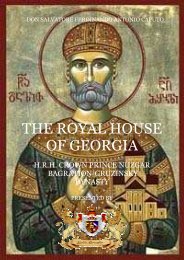here - Nobility Associations
here - Nobility Associations
here - Nobility Associations
You also want an ePaper? Increase the reach of your titles
YUMPU automatically turns print PDFs into web optimized ePapers that Google loves.
that Frederick II was forced to depose the Apulian Pandolfo of Fasanelle for years<br />
captain general of Tuscany, and replace him with his son Frederick of Antioch, who<br />
soon took the title of King of Tuscany.<br />
Frederick of Antioch was known by everyone as the kings not<br />
only because the Emperor’s son, but also for the extraordinary<br />
powers that were conferred to him (GP Carosi, op. Cit., P 28-<br />
29). Malispini recall (recall Malaspini, op. Cit., P. 995) says:<br />
"Frederick of Antioch, his son, was king." Furthermore the title<br />
of king is given to Frederick in the notarial acts of the time, and<br />
in those of many municipalities. In the Protocols of the city<br />
council of San Gimignano, King Frederick of Antioch is<br />
indicated at least fifty times (P. Ridola, op. Cit., P. 210). His<br />
son, Corrado Caputo of Antioch is still remembered as king in Treja, the ancient<br />
Montecchio and Anticoli. The popular tradition which attributed titles, not always<br />
legally justifiable, extolling the personal value of the individual characters (Alberto<br />
Meriggi p. 36).<br />
(Portrait of Frederick of Antioch, King of Tuscany, rebuilt for the first time from the tomb sculpture<br />
- the work of the journalist-Georgian painter Nato Sichinava. The picture was kindly forwarded to<br />
us by Paolo Francesco Barbaccia Viscardi a pretender descendant of the Hohenstaufen Dynasty.<br />
The young man was clever, energetic, prudent, and able to cope with the difficult<br />
situation of Tuscany, brave warrior and poet, kind gentle songs, was so lovable<br />
person and vague, that you'll hardly even saw him limping.<br />
Manfredi, his brother, was elected Duke of Taranto, according to the will and<br />
testament of Frederick II, regent, at eighteen, the Kingdom of Sicily, whose crown<br />
passed to him after the death of the legitimized brother Corrado IV.<br />
Frederick of Antioch had in Florence the center of his jurisdiction and in the course<br />
of his vicar took two notable successes: in 1247 he managed to conquer the city of<br />
Viterbo, and in February 1248 reoccupied Florence, as a result of a rebellion<br />
against the Ghibellines broke out in Parma and resulting implications for many<br />
destinations in Italy, had returned in the power of the Guelphs. These were the last<br />
of the great successes of the Ghibellines, These were the last of the great successes<br />
of the Ghibellines, the death of the Emperor and the succession of adverse events to<br />
the Swabians marked the beginning of an irreversible decline. It is well to mention<br />
that with the siege of Parma (1247), Emperor Frederick II made his son Frederick<br />
King of Antioch, so now his children become princes for legitimate descendent.<br />
In March 1247 Frederick met his father in Siena while the latter was on his way to<br />
Lyon to meet Pope Innocent IV. A general uprising diverted the emperor, and<br />
Frederick went north in August to join the siege of Parma. This was the only time<br />
The Hohenstaufen Dynasty - Page 130 of 200



